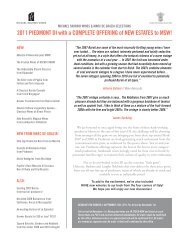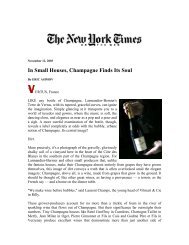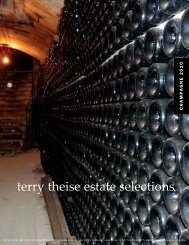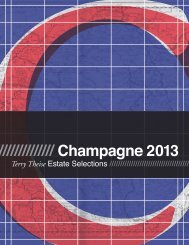German Catalog 2006 USE THIS ONE.qxp - Michael Skurnik Wines
German Catalog 2006 USE THIS ONE.qxp - Michael Skurnik Wines
German Catalog 2006 USE THIS ONE.qxp - Michael Skurnik Wines
You also want an ePaper? Increase the reach of your titles
YUMPU automatically turns print PDFs into web optimized ePapers that Google loves.
28<br />
Ah but this isn’t P.C., you see! In a topsy-turvy<br />
world where Trocken = Proper it follows rationally (if<br />
horrifically) that the potential quality inherent in a site<br />
has only to do with the goddamn residual sugar in a<br />
wine from that site. Too bad it’s nothing less than the<br />
imposition of an ideology disguised as a “helpful” classification<br />
for the consumer.<br />
It is also a dreadful violence to individual wines.<br />
Doesn’t anyone in <strong>German</strong>y actually taste wine any more?<br />
Never mind what might be suitable for this wine or that!<br />
They MUST be dry. Let’s LOBOTOMIZE these wines.<br />
Abandon fruit, all ye who enter here. If one of you wellmeaning<br />
but disastrousl<br />
y<br />
wrongheaded<br />
people<br />
are reading<br />
this,<br />
please,<br />
forget all<br />
y o u r<br />
abstractions, “the market,” “consumer taste,” “the modern<br />
drinker” and just taste wine! If you make wines that<br />
taste balanced and taste delicious you will—imagine!—<br />
find a market for them.<br />
You will also avoid a bizarre polarization you yourself<br />
created with your dogmatic rigidity. For a grower can<br />
— and almost always does — bottle a dry wine from his<br />
peak-site called Erstes Gewächs, and another from the<br />
same site called Pudyanker Slugberg Riesling Spätlese,<br />
and what’s the “market” to make of that? “But wait . . .<br />
aren’t those from the same vineyard . . . ? Why isn’t the<br />
Spätlese also Erstes Gewächs?” Ah, you see; because the<br />
presence of the dreaded residual-unmentionable means that<br />
it cannot be sold under the banner of a “great growth”.<br />
And all this was done in order to . . . .simplify?!?!? What<br />
it does in fact is merely to stigmatize the wine with sweetness,<br />
and so its effect is to advance a thinly veiled agenda.<br />
People can make any points they want, but I’d prefer<br />
they be made openly. By the efforts of these apostles of<br />
marketing it becomes clear they seek to brainwash the<br />
“market” into despising Rieslings with sweetness (and<br />
accepting the so-called “noble-sweet” dessert wines<br />
doesn’t count, pal!) and it’s the sneaky stealthy manner in<br />
which it’s being done I find so repugnant.<br />
All in all I’m starting to wonder about the VDP.<br />
They seem to opt as if by instinct toward ideological<br />
strait-jackets. They frequently fix what wasn’t broken<br />
while neglecting what is. Low yields, environmentally<br />
friendly viticulture, hand-picking, strict ripeness minima,<br />
all O.K. Good place to stop. Vineyard classification,<br />
also O.K: I proposed one myself in a DECANTER article<br />
back in 1985. Rather blatantly self-serving (e.g. FAR<br />
too much Grand Cru land in marginal Rheingau villages<br />
which are home to VDP members) but still, it<br />
needs doing and any start is better than none.<br />
Good place to stop. Leave well enough alone. But,<br />
alas and inevitably, the “marketing” guys pull up in the<br />
white truck with the jackets and the Procrustian bed<br />
and the syringes and scalpels and electrodes. Let’s<br />
establish prices, they insist. Let’s decree that only<br />
Riesling can be called Grand Cru (or “Erstes Gewächs”<br />
and other such lingual abominations), and let’s further<br />
decree the precise parameters of residual sugar a priori.<br />
Time to REWIND the tape to just before the silliness<br />
started, eh guys?<br />
Look, it’s always dangerous to force a wine to fit an<br />
idea. Better force the idea to fit the wine, because the<br />
wine exists in nature, it is there, real and immutable. And<br />
if we respect its being and let its needs be heard we’ll<br />
make something beautiful from it. Yet a certain kind of<br />
person feels safer among abstractions. Maybe he’s a<br />
whiz-bang conceptual thinker, and it’s O.K. to let him<br />
play with his toys, until he wants to turn them into everybody’s<br />
toys. It’s always healthy to maintain a distance<br />
between marketing people and wine, especially so when<br />
the marketing people are conceptual-intellectual<br />
<strong>German</strong>s. “Hmmm, let’s see; we have determined that all<br />
wines in this discussion should fit into round holes,<br />
because the “market” needs round-holed wines.” But<br />
what if the wine is square shaped? “No! This doesn’t fit<br />
the concept!” Even if the wine is more beautiful that<br />
way? “No. If it’s square shaped then we will just pound<br />
the living crap out of it until it fits in the round hole!”<br />
They will howl I am being unfair. All Chablis is<br />
understood to be dry, they will say. All “Erstes Gewächs<br />
Gerümpel” should also be thus simplified; the “market”<br />
demands it. Really? Is the Chablis really as predictable<br />
as all that? Is it one of them with malo or no malo, with<br />
oak or no oak, lees or no lees, all-stainless or all cask in<br />
the cellar? Shall we legislate every conceivable variable<br />
out of our wines?<br />
Ah but you see, the only variable that matters is residual<br />
sugar, because we are obsessed with residual sugar,<br />
because<br />
we have<br />
f o r<br />
some<br />
p e r -<br />
verse<br />
reason<br />
turned<br />
it into<br />
the sole<br />
aesthetic<br />
CRUX<br />
of the matter. Sugar doesn’t matter, folks, except as an<br />
agent of harmony, one among many, an especially helpful<br />
one at table, but finally just one of many facets. Yet singled<br />
out for special villainy in a world gone gaga.<br />
In full view of the good being done by the VDP, I<br />
sadly conclude they are doing even more harm. For the<br />
member growers they do provide a marketing platform,<br />
but at perilously high cost − beyond the hefty<br />
dues the grower pays. The estates I like best are the<br />
non-aligned, the intuitively sensible and flexible, the<br />
Selbachs of this world.
















